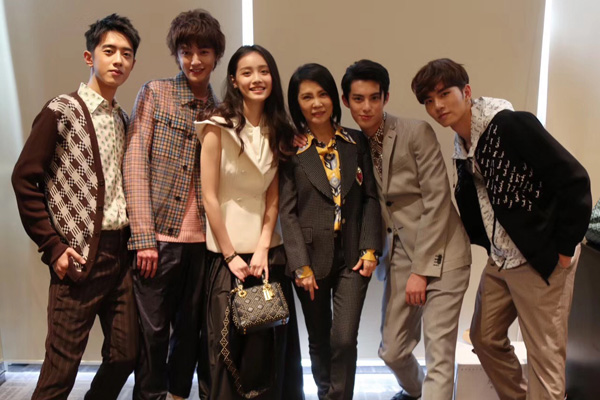 |
|
Angie Chai (third from right) with actors of a new mainland adaptation of Meteor Garden. [Photo provided to China Daily] |
Consequently, her formula has always managed to remain a certain degree of freshness.
In 2002, she was listed by US magazine Business Week as one of the 25 "Stars of Asia", as a leader at the forefront of change in the region. People hailed Chai for changing the way dramas were made, and for developing the market. But Chai says she did not realize how successful she had become until she visited a modern art museum in New York.
There, she discovered an artwork painted by American artist Mark Rothko.
"At first glance, I thought I might have been able to create a similar style of painting at elementary school," Chai says. "But why did it sell for hundreds of millions dollars? It is a model of abstract expressionism, which contains the artist's deepest emotions and inner voice.
"Something may look simple in the eyes of future generations," she explains. "But if you're the first person of your time to come up with a new concept and then realize it, you should be recognized for it. I realized then that this also applied to me."
Now, Chai is undertaking a major new venture that is challenging her skills as a producer.
A new mainland adaptation of Meteor Garden will be screened later this year, which could create another collective memory for a new generation of teenagers-with Chai once again at the helm.
"At first, I thought an adaptation would just be a meaningless copy," she admits. "However, I later decided to take it on because I wanted to have a dialogue with my younger self, a person who had no real experience back then. I wanted to figure out the changes that have happened to me."
Nevertheless, Chai says new themes will be added to the upcoming production. In the original series, the gap between rich and poor was the main focus of the story, but in the new version she wanted to explore the gulf between the different values and ideas that young people hold today.
Her role as producer of the series has also taken Chai in a new direction. When she made Meteor Garden in 2001, each episode cost less than 200,000 yuan ($31,700). Now the budget for one episode of the new series has ballooned to 3 million yuan.
One production company she contacted suggested that Chai include a celebrated actor in the cast, but the actor only had a window of 100 days available for shooting. By Chai's estimations the role would require at least 6 months of shooting to complete, and she finally decided to turn down the offer: "For a 50-episode production, how could this be long enough for someone to become familiar with the lines and grow into the role?"
While this prompted her to switch to a cast of new faces, she soon realized that producing a TV series in the internet era presented many new challenges.
"The times where people will accept whatever you give them are long gone," she says. "People's tastes are more refined and opinions are more divided. They will immediately speak out (online) to judge the storyline or an actors' performance."
But she still believes that the choice of format does not matter as much as the sentiment.
"No matter which format we use, we creators still have to express our inner beauty," she says.
Nevertheless, it is becoming more difficult for a picky audience to believe in the idealized characters presented in this genre of youth-oriented drama.
In the time of the original Meteor Garden, many teenagers were quick to identify with the characters and believe their lives reflected their own situation. However, a common question Chai is often asked today is: Since you have created so many fairy tales, how can you be in touch with the real world and all its cruelty?
The moment when Taiwan actor Kai Ko, a rising star from You Are the Apple of My Eye and the Tiny Times franchise, burst into tears in front of hundreds of reporters in Beijing in 2014 as he apologized for his drug use, may have been one of those moments for Chai. Standing by his side, she couldn't have failed to understand the cruel nature of life in the real world.
Ko, an idol who had the potential to become another superstar like F4, suddenly saw his career on the Chinese mainland come crashing to an end because of the scandal.
Taking to the stage in Beijing once again, Chai says there is no meaningful life without regret.
"I hear too many young people complain about the reality of their lives," she responds.
"But if you open your heart, take your life seriously and don't waste your time, why does happiness have to be a fairy tale?"